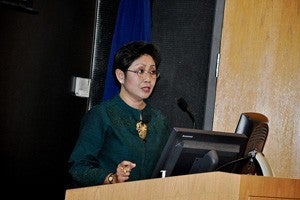July 15, 2011
Improving access to health care for more than 237 million people spread across the sprawling 17,000-plus island Republic of Indonesia is fraught with logistical and political challenges, Dr. Endang R. Sedyaningsih, MPH ’92, SD ’97, Minister of Health for the Republic of Indonesia (pictured), told a packed house May 20, 2011, in Kresge Auditorium G2.
Not only does the world’s fourth most-populous nation span a distance equal to the width of the U.S., but the Southeast Asia nation is perched above the Ring of Fire—one of the world’s most active earthquake and volcano zones. As if managing public health amidst 130 active volcanoes wasn’t challenging enough, there’s the issue of trying to institute standards across a decentralized health system, she said. The nation has 33 provinces, made up of over 500 districts and municipalities, each with their own health budgets and facilities. “The role of the central government is more steering than rowing,” Dr. Sedyaningsih said.
In her first visit to the School since receiving her MPH in international health in 1992 and Doctor of Public Health in social epidemiology here in 1997, Dr. Sedyaningsih told of her work to achieve a just, self-sufficient, and healthy society for Indonesia. Her talk, “Efforts in Materializing Health Care Equity in Indonesia,” was part of the Dean’s Distinguished Lecture Series.
Dean Julio Frenk said in his introduction, “Dr. Sedyaningsih is a wonderful example of a very accomplished alumna of HSPH—a highly trained, educated scientist who has moved into a position of leadership in a ministry of health.” She is one of the world’s top figures in health reform as she seeks universal health coverage and leads a profound public health reform effort in her country, he said.
Dr. Sedyaningsih, who holds a medical degree from the University of Indonesia, said she is grateful to HSPH for preparing her for her career. She has served as a clinician in a Jakarta hospital and headed a health center in a remote Indonesian district. She previously worked as researcher and director of Indonesia’s Center of Disease Control Research and Program Development and advised the Department of Communicable Disease Surveillance and Response at the World Health Organization in Geneva, Switzerland.
Since being appointed Minister of Health in October 2009, improvements have been made in areas such as maternal and infant nutrition and immunization rates. Dr. Sedyaningsih is working to improve access to the country’s 1,500 hospitals, 9,000 primary care centers, and 200,000 village health posts, ensuring that patients are not turned away. She is lobbying for increased funding for the Health Ministry budget, though most of the funds are controlled by local governments. Much remains to be done to lower maternal death rates, initiate disease prevention programs, and extend the average lifespan, which is currently 70 years of age, she said.
Expanding universal health assurance (“Most Indonesians don’t like the word ‘insurance,’ she said) to all Indonesians is a top priority. About 54% of people are covered. Her goal is for everyone to go to the hospital and receive any treatment for free, though she noted that the country does not have the resources to treat everyone yet.
Revitalizing primary care, addressing health disparities, and decreasing maternal mortality by having more health professionals attend to births are important goals, said Dr. Sedyaningsih. However, she wants to empower people to recognize that they have to work to improve their health status, and not rely on the government to do it for them.
William Hsiao, K.T. Li Professor of Economics in the Departments of Health Policy and Management and of Population and International Health at HSPH and a global health reform expert, Dr. Sedyaningsih, and Dean Frenk took questions from the audience following her presentation. Hsiao congratulated Dr. Sedyaningsih on reducing infant and maternal mortality in Indonesia and for her contributions to its people. “I see that HSPH has given you a different vision. You are concentrated on health promotion and prevention rather than how to treat people in tertiary hospitals,” he said.
Hsiao questioned the government’s decision to decentralize responsibility for health care in 2001. “Is it really good policy?” he asked. He questioned how the universal assurance plan, for instance, will mesh with a decentralized system. “How are you going to steer between all these contradictions between policies?” Hsiao asked.
Anuraj Shankar, senior research scientist in HSPH’s Department of Nutrition, discussed at the end of the session how Indonesia compares with other countries in terms of women and infant health. He said it’s important to collect data on health initiatives to evaluate if programs are succeeding, but noted that public health is also about heart. “The Honorable Minster of Health is a too rare example of an individual who has both the technical skills and a lot of heart,” he said.
Dr. Sedyaningsih cited an old Chinese proverb in summing up her health reform efforts: “No matter how far your destination is, making a right step will bring you a step closer to the destination.”
View a webcast of Dr. Sedyaningsih’s talk.
–Marge Dwyer
Photo: Aubrey LaMedica
